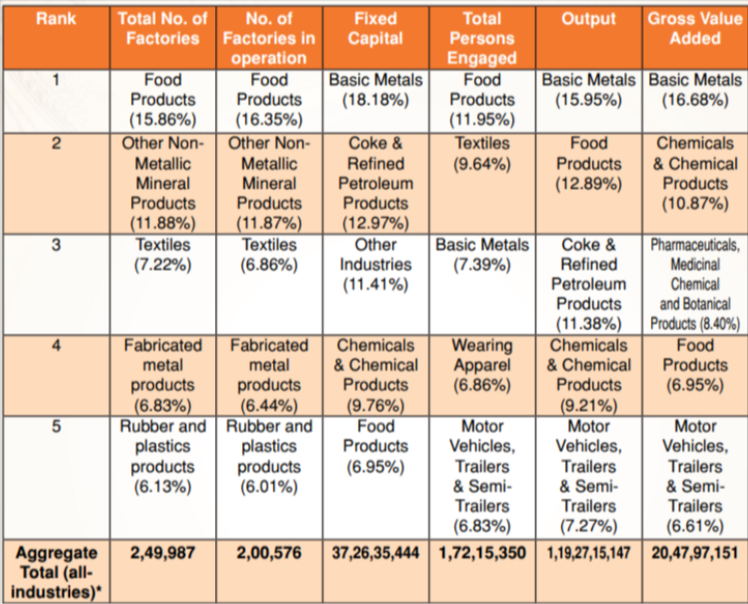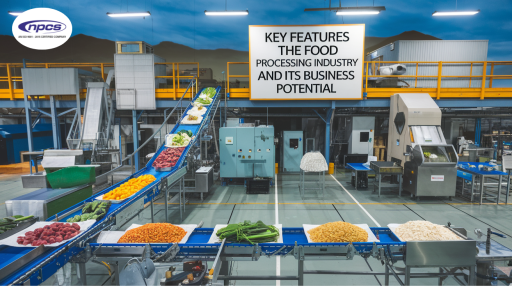The food processing industry maintains its status as one of the most active and expanding business sectors while staying vital for worldwide economic activities. Table 2.2 from the Annual Report 2023-24 shows that the industry is substantial because it contains important metrics including factories, fixed capital, employment, output, and gross value added. The article investigates food processing industry features and detailed examines its enormous business potential, which provides extensive opportunities for entrepreneurs and companies to prosper within this sector.

Key Features of the Food Processing Industry
Significant Contribution to the Economy
The economy benefits substantially from the food processing industry because the sector possesses considerable percentages within multiple economic measurement metrics. An industry pillar of industrial activity because it maintains 18.18% of fixed capital, 16.35% of operating factories, and 15.86% of total factories. The sector stands as a major contributor to economic activity since it employs 15.95% of total industrial workers while generating 11.95% of the overall output.
Also Read: Indian Food Processing Industry: Growth Opportunities
Diverse Product Portfolio
The industry encompasses a wide range of products, from basic food items to specialised and value-added products. Multiple business segments achieve better market coverage because this diversity enables companies to serve diverse market needs. The food processing industry increases its market share because of its continuous efforts to produce new products while meeting consumer demand evolution.
High Gross Value Added
The food processing industry produces a major portion of the gross value added, which reaches 16.68 percent. The industry showcases high conversion efficiency regarding raw materials, thus creating significant product value during processing steps. Value addition through this process plays an essential role to drive economic expansion and national development.
Employment Generation
This sector operates as one of the main employment generators, while it serves as an employment opportunity for a substantial number of workers. The food processing industry reduces unemployment by occupying 11.95% of the total persons engaged, thus contributing to socio-economic development.
Infrastructure and Capital Intensity
A considerable amount of fixed capital investment is needed for the industry because of its 18.18% share in the total fixed capital. The necessary capital intensity supports facility development of advanced processing units while enabling quality control functions and security measures for high-standard food safety operations. Infrastructure within this sector fuels economic growth by enabling other related industries that produce chain reactions in the economy.
Business Potential of the Food Processing Industry
Growing Consumer Demand
The worldwide human population continues to increase while society requires an escalating number of processed food products. The food market expands because customers want easily accessible products that offer both nutritional value and safety guarantees. Businesses possess an important chance to develop their product range while exploring market opportunities.
Technological Advancements
Food processing received a transformation through technological advances, which include superior preservation solutions and intelligent packaging solutions along with self-operating production facilities. The developments enable businesses to improve product quality and lengthen product lifespans while using fewer manufacturing expenses, which increases their profitability.
Export Opportunities
The food processing industry possesses massive export capacity because numerous nations currently import prepared food products. The adherence to international quality standards and certifications allows businesses to enter global markets, thus resulting in increased revenues.
Government Support
National governments across the globe have started to understand the significance of the food production sector by implementing different policies that offer incentives to support the industry. Small businesses can enter the market with ease through government assistance programs that offer tax deductions together with financial aid and infrastructure construction.
Sustainable Practices
The industry’s focus on sustainable practices involves developing waste reduction and energy-efficient and environmentally friendly packaging methods. The current consumer momentum towards environmentally responsible practices benefits businesses that implement sustainable operations because they develop better market performance and an improved company image.
List of 33 Profitable Food Manufacturing Business Plans
Strategies for Success in the Food Processing Business
To succeed in the food processing industry, businesses must follow strategic plans that match present market directions alongside customer buying habits. Business success requires product innovation because customers now prefer food items that are healthier and more convenient with sustainable production methods. The investment in research and development enables companies to generate distinctive products that fulfil market needs, thus differentiating their businesses from other competitors.
Through digital marketing and e-commerce systems, businesses can now access entirely new markets while developing robust connections with their customers. Using social media platforms, e-commerce channels, and online advertising methods allows businesses to amplify brand exposure, which results in increased revenue. Companies that adopt environmentally friendly practices gain cost savings together with a better brand image as well as attracting environmentally focused buyers.
The partnership with local farmers together with suppliers enables businesses to obtain reliable access to top-quality ingredients, which simultaneously aids nearby communities. Strategic certification acquisition, including ISO, HACCP, and organic standards, allows businesses to gain market credibility as well as unlock access to new client markets. Businesses operating in the food processing industry should utilize these strategies as a way to achieve long-lasting expansion and maximize their worldwide market potential
Conclusion
The food processing industry operates as a main business sector that extends vast opportunities for growth. The industry’s vital features, including substantial economic value and varied product creation, together with high added value, job creation, and capital requirements, attract entrepreneurs as well as businesses to this field. The industry maintains strong growth potential because of rising consumer numbers together with advanced technologies as well as export capabilities together with government backing and sustainable operations.
Potential entrepreneurs who want to launch a food processing operation must complete complete market research; additionally, they must create a thoroughly planned business framework. The food processing business consulting services provided by Niir Project Consultancy Services (NPCS) allow you to tackle the difficulty of opening and expanding your food manufacturing enterprise. The NPCS website at https://www.niir.org/ demonstrates the ways the company can support your business objectives and maximise food processing sector potential.







